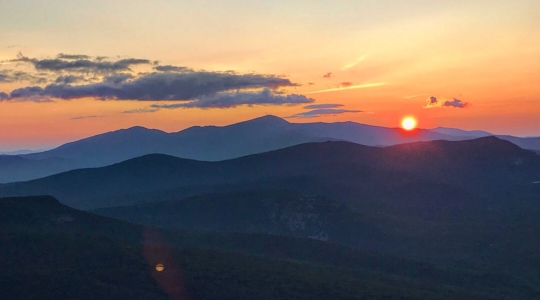Lost Weekend

This is a memoir of events in November 1993 and true in all particulars save the name of my companion
Food is, after a long day of hiking over rough terrain with heavy packs and disappointments, a thing to be savored. The sharing of sustenance, no doubt a primitive acknowledgment of commonality and non-aggression, is cherished on every trail I have trod over six decades and six continents.
The wind, boiling up out of the Great Gulf to funnel into the narrowing defile, pummeled its way up toward us and engaged the thousand-foot headwall within the small swale. We heard it start within minutes of the early sunset. Before we finished scraping cookpots clean with handfuls of grit, before we tied down the tent, and well before we crawled into cold sleeping bags, we heard trees crash within the forest below.
It was not the first time I had tried to climb this mountain. Solo, the previous year, I had made an attempt in early spring. Skiing in from the west, I hoped to use a trail of huts to reach the “fishhook” crest of the Presidentials. I never made it that far. Stream crossings in winter depend on the continued hostility of the weather. Congenial weather turn snow bridges traitor; I escaped with a soaking.
This time, in early November, I came with company. Dan, then like me in his mid-forties and well-acquainted with hiking and climbing, had first climbed Mount Washington on his return from Viet Nam. Even so, we had spent that morning on a futile attempt to climb the Six-Husbands Trail, named for a much-married Native American. Faced with a slush-covered trail canting up and out into thin air, we retreated. We had equipment for a hike but none for an early-winter ice-climb.
Backtracking to the Peabody River, looking more like an ice-rimmed creek, we turned up its valley, the Great Gulf, toward the headwall. We could then make a long day of it tomorrow. Summiting and then going down through Alpine Garden and Tuckerman’s Ravine, we could return to our car at the Adirondak Loj, the official spelling, before sundown.
That afternoon, our progress was steady, even with the last sharp climb next to a desultory waterfall. Arriving late in the day, we entered a small swale, dry and dead, almost surrounded by the glowering headwall of the mountain, its top lost in fog. In the middle of the swale we found a sign nailed to its one remaining but lifeless tree: CAMP HERE ONLY.
So, we did—well away from that widow-maker tree. Despite the wind’s wild tumult, sleep eventually found us, waking us only briefly when waves of rain began to crash against the tent. Fatigue triumphing over tempest, we slept on until, in the grayness that is not dawn, Dan rolled over.
We both awoke to the sensation of floating on choppy seas.
“What’s wrong with this picture?”
“Water under the tent. Get out!”
Dan rolled out first while I packed essential gear. Before I could emerge, water, cascading white across the low sill of the tent, began to fill the small space. I chose to exit forthwith. We started that day soaked, the temperature hovering around fifty.
Overnight, the swale had transformed. Instead of yesterday’s dry deadness, it was alive with surging water, seemingly coming from all directions. Surrounded by the unclimbable rock of the headwall, the swale, like a cup, had filled to overflowing. All the equipment left outside, save a single pot, was gone. Within fifteen minutes, carrying water-heavy packs, we waded back, knee-deep, the way we had come the evening before. Yesterday, our entrance had been marked by the desultory waterfall and a small stream, its flow not even deep enough to top the toes of my boot.
A roaring current, twenty-feet wide had swallowed the creek whole. To our front, roots from a fallen tree swirled in the water, lashing out at us in seeming anger. To our right, the little dribble of a waterfall had become a cataract, spouting white water four feet out from the verge into the unseen valley below.
“Let me see how deep it is,” I said. Wading into the current, I retreated when soaked to the armpits and feeling the suck of water trying to fling me into the void. Standing in cold water, surrounded by rock and torrent, we were trapped.
“Let’s follow the stream uphill. Get high enough to cross and then downclimb from there?”
“Oughta work. Lead on.”
It did not work. A huge blow-down, a tree, roots undermined by the water and then toppled with the wind, blocked our path within fifty feet uphill of the waterfall. We could see several more ahead of the first. Each would require us to take off our packs and negotiate the chaos of branches emerging at all angles from the chest-high tree trunk. If successful, we then must haul our forty-pound packs through this thicket before we could take a few more steps to the next blow-down.
“Not gonna work. Maybe we can use it as a bridge?”
“Could,” agreed Dan. “My turn,” he said, shooing me back. Dan approached the stream with the trunk upstream of him, keeping his pack on, for the extra weight. Each handhold, stubs of broken branches, looked solid as Dan moved from one to the next in the waist-deep flow.
Fifteen feet away from me the current swept him away. Turning in the stream and looking back, we locked eyes. His face never changed. My immediate thought was, “Dan is dead,” followed instantly by “We both are.”
Dan carried the tent.
Breaking my gaze, I turned and ran. Slipping, slogging, accepting body-blows from trees and falls from hidden holes, rising from scraped knees and hands with but a dim idea of a goal, I stopped only when the abyss of the waterfall loomed in front of me. Dan, held up momentarily by the entangling roots of the downed tree, was no more than ten feet from me on the opposite bank. Within a minute, we were back to where we started.
Submerged and then pressed to the snag-laden bottom, Dan had given up any hope of rescue until an errant current brought him to the surface near the downed tree roots. Scraped, bludgeoned, and water-logged, he’d arrived at the waterfall just as I did.
There was no leaving that day. Finding the one spot in the entire swale above water, a few feet downstream from a downed log, I pitched the tent. Despite having to stake one corner in running water, the tent would shelter us from the wind and wet, if not the cold. Wringing out Dan’s sleeping bag and stuffing him into it, I went back to improve our position, adjusting logs and wedging others to secure them. Admiring my handiwork, I began shivering. After winter storms, the temperature usually drops, earning Washington its title of “most dangerous small mountain in the world.”.
Getting back to the tent entrance, I found Dan responsive but dealing with the pain of his injuries, a bad headache, and nausea. After stripping myself to the skin at the entrance and wringing out each article of clothing before replacing it, I eventually shuffled into my own damp sleeping bag. We were finally both out of the wind but no warmer.
We took stock. Among the casualties lost to the flood was my camp stove, floating off with its attached fuel bottle for buoyancy. No stove—no cooked food. We shucked out pockets and packs to collect all trail food, what we could eat cold. It made a miserably small pile of granola bars, chocolate, and jerky. Pride of place went to the Kudu bars, more candy than granola, and among Dan’s favorites. He insisted we share out everything evenly. The little meals disappeared into the many pockets of our clothes and jackets.
Despite its current abundance, water was another matter. Even this high in the mountains, water would be fouled from the flood. For the weight-conscious hiker, iodine remains the most efficient water purifier. However, to work at this low temperature, iodine requires five hours to work. An active hiker uses about four to five liters a day in cold weather. With four liter-bottles in our possession, we each had one bottle to drink and one to treat—as long as we were careful.
The temperature continued to drop; my shivering became constant. Fire inside a tent is dangerous: nylon burns and everything is nylon. Regardless, I retrieved a candle from a kit at the bottom of my pack. Thrown in years ago, “just in case,” the fat white paraffin candle had lived there ever since. Oddly, my butane lighter, carried on a lanyard and worn next to the skin, would not light; neither did my “back-up” matches. Dan’s were no more useful.
Years before, I had also thrown into my pack a modern take on a “flint-and-steel” tinderbox. It was one more neat little camping gadget of which the catalogs are full. Now shivering violently, I tried with that, the second time in all those years I had ever used it. Each attempt failed as my uncontrolled shaking made my attempts to get a big fat spark useless. Finally, hyperventilating several times to stop the juddering convulsions briefly, I succeeded. Bringing the small yellow flame to my candle and watching it come to life, I began to breathe again. Placed in the bottom of our one remaining pot, it sputtered out eighteen hours later.
From noon on Sunday to dawn Monday, we stayed in the tent. I woke Dan at regular intervals: “Who are you? Where are you? Who am I?”
And we talked through that long, ever colder day and night.
We told stories: true, false, and improved.
“Never travel with a bad liar or a good memory.” Good liars and a poor memory for stories you might have heard a hundred times before are much to be preferred.
We talked about politics and religion. We talked about money. We talked about The Distant Mirror by Tuchman, a book Dan had just finished and about Skinwalkers by Tony Hillerman, one I had just finished. Dan slept, troubled in his sleep, as he frequently is, by memories of a mostly forgotten war. It got colder. Each time I flicked on my light, frost lining walls of the tent had crept closer from its drowned foot towards our heads.
By dawn, emerging like writhing jointed caterpillars, we found the landscape transformed once more. Now drained of the flood, overnight the swale had frozen into the brittle silence of ice. At ten degrees Fahrenheit, the cold had frozen the waterlogged ground, making it good for walking—bad for much else. The tentpoles, twelve-feet-long and made up of jointed sections, had frozen into a single piece, impossible to pack. Fortunately, I had not emptied my bladder. A little experimentation and we had an “on-the-job” fix, melting the joints quickly despite the loss of a water-bottle in the process. Dan laughed.
We spent most of the morning crossing the once-more negligible brook, down-climbing beside the frozen waterfall, and negotiating blow-downs. Trading progress for dwindling reserves of energy, our hike became, in the parlance of hikers, a “death march.” Since time is short and food is scare, there will be no rest until the end of things.
We marched on into an abandoned landscape, meeting no one. Below the sounds of our boots ringing on the icy trail, the hills groaned and snapped with the sounds of trees surrendering to their burdens of ice. I recovered my stove. Hung up in a leafless bush high above the now calm river, it was adorned with a four-foot-long icy stalactite of ice. We ate and drank what little we had while walking. We no longer talked.
By late afternoon, we left the Great Gulf to walk overland to the Loj, a long dry slog over a well-marked and gentle grade. By this time, I was out of water, having missed my last chance to resupply before leaving the Peabody. No great obstacles remained other than to cover the distance in the time remaining. Strangely energized, I let my mind wander.
Feeling like a man in a bear pit, to survive I must keep Fatigue and Hunger at bay. Watching my adversaries quietly, giving nothing away, I waited for the least telltale that one or the other would make a dash at my welfare. Walking in that unthinking reverie of the moment, I imagined the creatures coming out of the darkness toward me. At first, I could see only their eyes, red in the uncertain light, blinking out when I shifted an illusory spear. Slowly the dark coarse forms separated from the blackness, huge bearlike creatures, unnaturally heavy in the shoulders with saber-like fangs, bared for my inspection. I was adjusting my grip as Fatigue clawed the gravel in preparation for a charge—when I thought to look behind me.
Dan, fading along with the light, was now a hundred yards behind me. Exhausted, in pain, and nauseated from the effort, his face flaccid of expression, he said nothing as I joined him.
“We can’t walk in like this.”
“Right,” he said vacantly.
After wordlessly buttoning all buttons, zippering all zippers, and tabbing all tabs, we walked on arm-in-arm. Arriving among the out-buildings of the Loj in the dark, we trudged through the maze of unlit structures to the entrance. In doing so, we met a young man in shirt-sleeves, running between buildings on an errand, and exchanged brief greetings.
After going on his way for a few paces, he turned back to us and asked me, “Hey, are you Dan?”
“No. He’s Dan,” I said, pointing.
“Yo, Dan! Your wife called.”
And indeed, Susan had. We turned the corner to the front porch to find it covered with about twenty people, rigging their packs in preparation to rescue us—or recover our bodies. The storm had already claimed eight lives elsewhere. The squad leader made the friendly suggestion that we might get lost “a little,” so that his squad could get a little practice. We declined.
After a shower, the best two dollars I have ever spent, we made a trip through the commissary line at the Loj minutes before it closed. In the midst of dinner, a state ranger approached us. He explained that, as a rescue had been called, he had to complete a report. Going through a long list of questions, including what equipment we had, what maps we used, and where we had roosted above the flood, he finished by asking about food.
“No. No food left,” said Dan, just as I showed my one remaining Kudu bar from an outside pocket.
Dan looked at me in disbelief and horror, “You had food?”
Puzzled at the response, I could only say, “Just in case it got bad.”
We have never spoken about that despite our many subsequent trips with their own stories and their own lies.
I no longer am entrusted with Kudu bars.
‹ Back








Comments